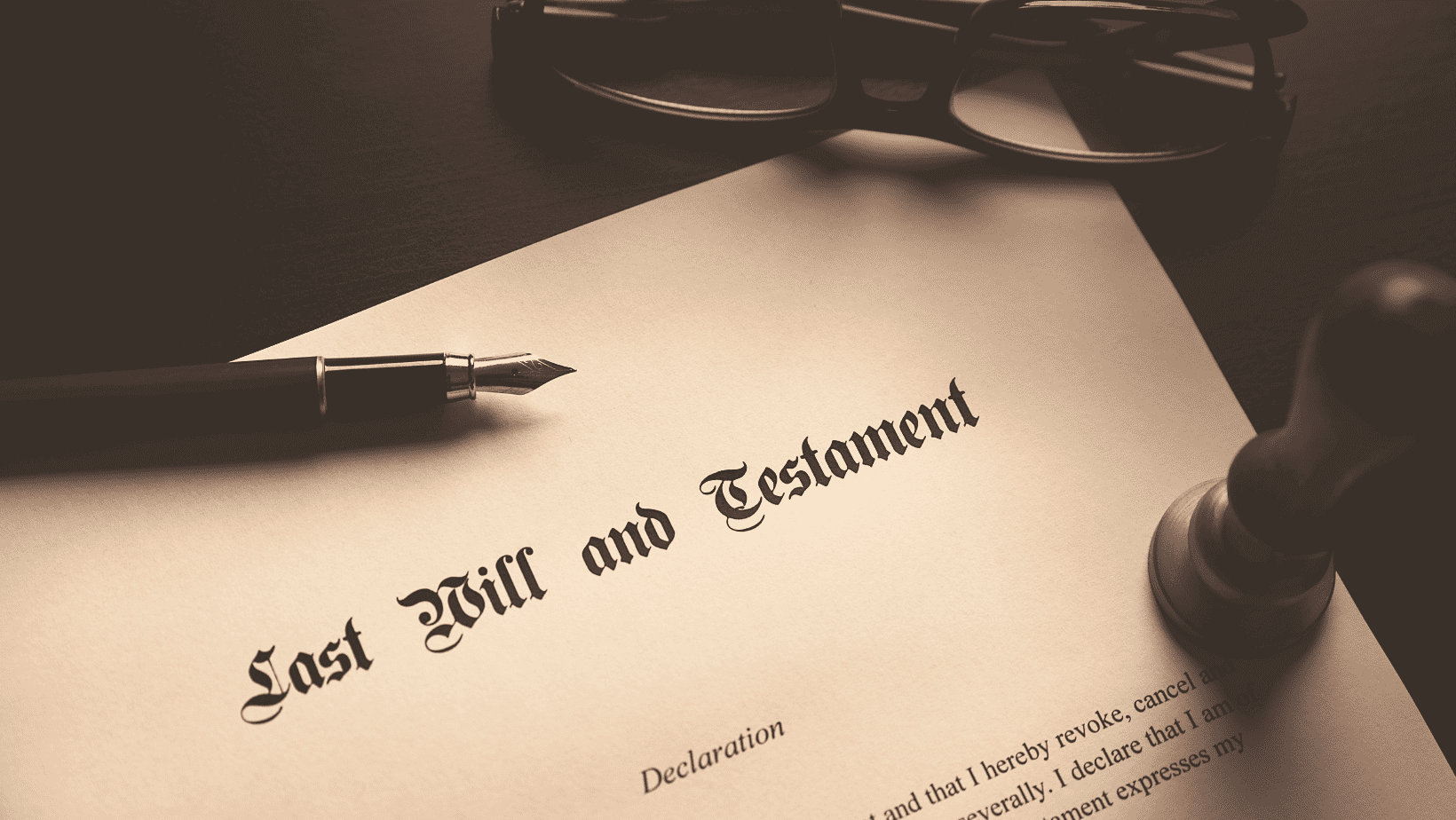Understanding the basics of estate planning can be tricky, but it is an important task to undertake. With this guide, we will help you discern what type of tool best fits your needs and requirements. Whether that’s a Will or Trust, as well as various other specialized trusts available for different purposes. Together we’ll navigate through the complexity behind wills versus trust and ultimately determine which one provides optimal security in terms of protecting all your assets during life changes.
Short Summary
- Wills and Trusts are two important estate planning tools with different levels of control, privacy, taxation implications, and probate processes.
- Comparing wills vs trusts is essential to understand their respective benefits for asset management & distribution.
- Professional advice from an attorney or financial advisor can help make the best choice based on individual objectives & circumstances.
Wills and Trusts: Key Components

Wills and trusts are key elements of estate planning that enable the division of assets following one’s death. Wills give directions on how to split these possessions, whereas with a trust, they will be handed over to somebody chosen by the holder in order for them to manage it. Each offers various degrees of control, secrecy and taxation implications, so let us break down what sets wills and trusts apart from each other.
Estate plans need tools such as both these documents. While having similar purposes, they function differently – providing distinct advantages depending on an individual’s goals when organising their property distribution after passing away.
Wills

A last will and testament is a legal paper that outlines the means by which assets should be divided upon someone’s passing, comprising of funeral arrangements, guardianship and division of property. Both wills and trusts can provide guidance in managing these resources While wills are clear-cut they do not give complete control over investments accounts like what a trust would offer. These Wills must go through probate court before being finalized as public record, this legal process often proving lengthy and costly. In contrast to this methodical approach, trusts permit for more customized provisions around estate divisions with options sometimes unavailable via other routes such as an uncomplicated Will.
Trusts
Trusts are instruments of estate planning that transfer assets to a trustee, who is responsible for managing and distributing them as per the instructions given by the grantor. This form of financial and legal arrangement also allows more control over funds than wills do, plus can avoid going through probate. Trusts come in two varieties. Revocable or irrevocable depending on how much power they give away & their tax implications respectively.
The advantages trusts offer mainly include bypassing probate proceedings quickly & securely without revealing sensitive personal information associated with those accounts held in trust during such asset transfers efficiently- beneficial both economically and privately to heirs benefitting from it. Trustees must act according only to state law and its terms set forth while taking into account what would be best for beneficiaries at all times since they too hold fiduciary responsibility towards administering trust’s assets justly and fairly.
Comparing Wills and Trusts

When considering an estate planning decision, one must understand the contrast between wills and trusts. Both of these techniques are designed to provide different advantages in regards to probate process privacy issues as well as avoid estate taxes due on estates.
To comprehend more thoroughly the distinctions among them is essential for selecting what works best for any particular requirements. Regarding such aspects like taxation on assets or proper proceedings related to proceeding executors through will need to be taken into consideration when determining which technique suits someone’s needs better when it comes down to safeguarding their property upon death using either a trust or a last will statement.
We had a client, let’s call her Susan who was curious which option she should pick. I explained, wills are simpler and cheaper but must go through probate, while trusts offer more privacy and flexibility but are more complex and costly. Considering Susan’s wishes to keep her business in the family, fund her grandchildren’s education, and maintain privacy, I recommended a revocable living trust. This would allow Susan to control her assets during her lifetime and avoid the public process of probate. Susan agreed, valuing her legacy’s privacy and the empowerment of her descendants. The trust ensured Susan’s vision continued for future generations.
Probate Process
When someone passes away, the probate process is a legal means of distributing assets. This involves court oversight and can be slow-going, expensive, and may make private financial info public knowledge. In cases like these where wills are applicable to the proceedings, there could possibly be delays along with extra costs for those involved as beneficiaries.
Contrastingly though, through using trusts it’s possible to bypass all this hassle by allowing inheritances to travel into recipients hands much faster while preserving their privacy too – especially when dealing with larger or intricate estates in which going through large or complicated estate probate would only add up to more time as well as expenses needed from everyone included.
Privacy Concerns
When considering estate planning, privacy is a major issue for many people. Wills are subject to the probate process and thus become publicly available information which can expose personal data, such as assets and beneficiaries, increasing the chance of identity theft or receiving solicitations you don’t want.
Creating a trust is an effective way to protect your assets while keeping proceedings confidential from public scrutiny. Unlike with wills, there won’t be any record in place when it comes time for distribution, making sure no one knows exactly what was received. Trusts provide greater protection than that offered by will processes without sacrificing essential details about asset management either.
Estate Taxes
Estate taxes, including federal estate tax, can be imposed on property transferred from a deceased individual to their beneficiaries. Irrevocable trusts may help in reducing or completely avoiding the payment of these types of taxes as you are able to transfer assets into such a trust fund and it depends upon its size and type. On the contrary, when distributing via will, there is still the chance that your loved ones might have larger taxation liabilities depending on the worthiness of an estate. Carefully decide between using a will versus trusting funds based off potential ramifications for any expected tax burdens with both situations offering certain benefits associated with each case scenario.
Types of Trusts: Revocable vs. Irrevocable
When creating an estate plan, it is important to understand the differences between revocable and irrevocable trusts. Revocable trusts offer more control for the grantor while providing some tax benefits, while irrevocable trusts provide greater asset protection but fewer opportunities to make changes. In order to decide which trust type best fits your needs in terms of taxation or other considerations, you must consider both types carefully before making a decision. Both can be used as part of comprehensive estate planning strategies that work toward achieving desired outcomes with regards to taxes and beneficiaries’ interests being represented properly over time periods specified by those writing up their wills/trusts documents prior to death or incapacitation taking place effectively representing those persons “final wishes”.
Revocable Trusts
Living trusts, also known as revocable trusts, provide the grantor with adaptability in their estate plan. This means they can alter it during their lifetime and have control of all trust assets. This makes them part of a taxable estate which could be subject to taxes after death. When choosing an option for effective estate planning, one must take into account both the advantages and drawbacks that come with a revocable living trust instead of taking advantage of tax benefits from an irrevocable one.
Irrevocable Trusts
Irrevocable trusts are permanent and, therefore, cannot be changed or reversed after being established. Although this lack of control may seem daunting to some people, it can offer a host of advantages such as estate tax savings and asset protection. With an irrevocable trust in place, assets no longer belong to the taxable estate – resulting in reduced/no taxes for beneficiaries.
These types of trusts provide additional benefits through protection from creditors’ claims or legal proceedings that could otherwise become costly problems. Particularly if you have many possessions or there is heightened risk for lawsuits related to your activities – making them ideal when planning one’s estates goals and needs. While revocable trusts give owners more freedom over their finances, they don’t carry with them similar level benefits like those offered by irrevocable trust arrangements.
Specialized Trusts
Different types of specialized trusts exist for various reasons, such as philanthropic donations, assisting those with special needs or optimizing estate tax exemptions. These bespoke trusts are intended to satisfy certain objectives and offer advantages for both the grantor and recipients. Let’s delve a little deeper into some prevalent forms of these dedicated funds.
Charitable Trusts
Creating a charitable trust can be an advantageous way to both receive potential tax benefits and secure your philanthropic legacy. Such trusts benefit charities while offering certain financial advantages to the grantors or beneficiaries involved as well. Depending on how it is structured, either payments are made directly from the assets of the trust into designated non-charitable entities over time (known as a Charitable Lead Trust) or income is created for a predetermined period with any remainder reverting back to charity (called a Charitable Remainder Trust). In either case, remaining assets upon termination will eventually be distributed in some fashion within these structures.
Special Needs Trusts
Two kinds of special needs trusts are available to protect the financial wellbeing of people with disabilities, without making them ineligible for governmental assistance. Self-settled trusts include funds given by the beneficiary and third-party trusts rely on donations from other sources than that of the person who will benefit directly. Such an arrangement allows families to provide comfort in knowing their loved one’s economic concerns can be met while maintaining eligibility for beneficial programs funded through public resources.
Credit Shelter Trusts
Credit shelter trusts, also known as bypass or family trusts, are estate planning tools utilized by couples to benefit from the federal estate tax exemption amount without incurring additional taxes. These types of trust transfer assets into a protected entity that allows for a surviving spouse to access up to the threshold of said exemptions. Any amount exceeding this may be subject to an approximate 40% rate in terms of federal-level taxation at death. After passing away, these estates are then eligible for assessment pay estate taxes based on their accumulated wealth within the credit shelter trust, likely resulting in Payments when due.
Integrating Wills and Trusts in Estate Planning
To ensure that all assets are managed effectively, it is possible to integrate wills and trusts into a comprehensive estate plan. Combining the benefits of both instruments can provide an ideal solution that caters specifically to your needs.
So how do you bring these two pieces together in estate planning? Here we will discuss several options for combining them successfully.
Pour-Over Wills
A pour-over will is beneficial for those with a significant or complex estate, since it makes sure all remaining assets are forwarded to the trust as specified in its terms. Incorporating this into your estate plan ensures that you can take advantage of both ways of creating an effective plan. There would be no interruption between transferring and effectively using them. In other words, by having a pour-over will on top of your existing estate planning strategy, any resources left behind after death should easily move over into the designated trust so distribution amongst the designated beneficiaries always follows through efficiently.
Testamentary Trusts
By incorporating both a will and testamentary trust into your estate plan, you can ensure that all assets will be handled and distributed in accordance with your wishes. This approach offers many advantages over living trusts or wills – such as allowing for the appointment of guardians for minor children and making specific donations to selected individuals/organizations – while still preserving some control by providing flexible parameters. Testamentary trusts combine both elements from wills as well as living trusts. These funds only become available after death, transferring ownership to an appointed trustee who oversees distribution according to the conditions specified within it.
Choosing the Right Estate Planning Tool
When considering estate planning, it’s essential to consider various factors such as the need for asset control, privacy needs, tax implications and complexity of the estate. It is important to analyze both pros and cons of each tool before making a decision, expert guidance may be very beneficial in understanding your particular case.
Estate planning has many facets that must be taken into account when selecting an appropriate instrument. From size considerations all the way through ensuring sufficient control over assets while protecting personal information concerning taxes or any other related aspect associated with the whole process.
Factors to Consider
When making decisions about the right estate planning instrument, one must consider factors such as how much control they will have over asset distribution and trusts may provide a greater degree of privacy than wills since those become public knowledge. Estate tax implications should also be taken into consideration for anyone with larger assets who could benefit from potential taxes saved through certain trust vehicles.
Think about all individual goals in relation to age, health and family relations when assessing complexity levels associated with an estate plan – this helps inform better decision-making when it comes to selecting the most suitable tool.
Seeking Professional Advice
When it comes to estate planning, seeking the help of a professional such as an attorney or financial advisor is strongly recommended. They can provide advice on your available options and structure an estate plan that meets all your individual requirements while also considering any legal or tax implications from different tools. In this way you are able to make well-informed decisions about what’s best for you and ensure everything fits together correctly into one cohesive whole. Through their counsel, individuals gain greater insight regarding how they should go about making the most effective use of their estate plans in order to fulfill desired goals and intentions with confidence.
Summary
In order to create an estate plan suited to your particular needs and wishes, it is important for you understand the distinctions between wills and trusts as well as any specialized trust options. Estate taxes, control over assets, privacy considerations and complexity of one’s estate should all be taken into account when making a decision about which type of planning will work best. Seeking professional guidance is highly recommended in this endeavor too. Taking action by researching more deeply into matters concerning wills and trusts can help set the groundwork towards achieving greater security now—and in future years too.
Frequently Asked Questions
What are the disadvantages of a trust vs a will?
Trusts are more complicated and costly to set up, but they offer greater privacy and asset management since they don’t require probate.
Wills are simpler and cheaper, but they become public records when going through the probate process.
Why do people do wills instead of trusts?
A will provides the opportunity to name a guardian for any minor children or dependents and outline end-of-life wishes, while a trust allows assets to bypass probate and be distributed faster and with more privacy. Trusts also provide more control over how assets are passed on, while wills do not.
What are the disadvantages of putting your house in a trust?
Creating a trust may involve more costly expenses than just making a will, such as legal fees for registration or title transfers, filing charges and compensation of the trustee. It offers additional safeguards to secure your assets. To having freedom on how those properties are shared after you die.
Trusts can be structured so they can protect assets and resources from creditors and offer help when managing assets reserved for minor children’s welfare too.
What is the purpose of will?
A will is legal document is a legally-binding document created to specify how an individual’s assets should be distributed upon their death. It provides for the inheritance of those close to them, while also setting out arrangements for any minor children who may need guardianship afterwards.
It is vital that you consult with legal professionals when creating your will, in order to guarantee that it complies with all necessary regulations and guarantees that every one of your wishes are correctly fulfilled once passed away.
How do trusts avoid the probate process?
Trusts offer an alternative to the probate process, enabling assets to be managed and distributed by a trustee. This person is obligated to follow the trust’s terms strictly while acting with fiduciary responsibility in order for assets distributed by it to benefit its beneficiaries. The trust can provide direct transfers of these assets that will not go through court supervision or other formalities as part of regular estate-settling procedures.






